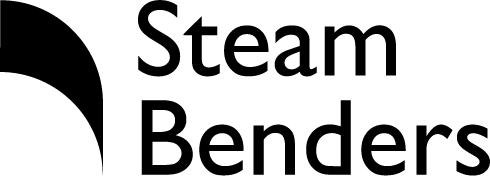Capabilities and Limitations.
Timber Species for Steam Bending:
It is important to note that not all timber species bend and some timbers species bend better than others. Some factors to consider: Indoor or outdoor use, desired aesthetic and the radius of the bend required, among others. In order to get the best out of the bending process and the end result, we recommend the following timber species as excellent bending timbers:
Imported Species:
• American White Oak
• American Ash
• American Walnut
• Beech
Australian Species:
• Mountain Ash, Tasmanian Oak, Victorian Ash
• Spotted Gum
• Tasmanian Blackwood
Our service is not limited to the above timber types, if you’d like to discuss different timbers for your specific project, get in contact and we can advise on the viability of your chosen timber.
Compression Marks:
Compression marks are indentations or marks that appear on the surface of timber after it has been steam bent. These marks are caused by the compression of wood fibers on the inside of the bend, which remain compressed even after the wood has been cooled and dried.
Imperfections in the Curve:
Natural variations in grain patterns and density can impact the final curve. These variations are inherent in timber and cannot be eliminated, thus they must be taken into account when planning your steam bent timber project.
Tolerances:
While our expertise in the field allows us to bend solid timber to your requirements, it is important to note that the process is an organic one, using highly variable natural materials. The variables in steam bending, i.e. stock dimensions, timber species and curve radius, all contribute to the challenge in achieving millimeter precision in bending. For these reasons tolerances need to be accounted for in your design. Bends supplied will be set in shape and hold their form, however for best results, steam bent timbers should be secured to and braced in place.
Tolerances in material thickness +/- 2mm
Tolerances in radius spring back +/- 30mm
Standard minimum and maximum lengths:
Our standard bending service limits the lengths of timber achievable. The maximum length achievable is 2800mm, where the minimum length is 1000mm. The maximum width of board is 300mm and maximum thickness is 50mm. please note, the thicker the timber the bigger to radius will need to be.
Timbers are typically bent and supplied over length, to later be trimmed on-site.
Standard Radii
The timber bending process requires specialised equipment including but not limited to formers and tooling, in order to bend to a desired curve and angle.
Compared with custom radii, as a more cost-effective option, we offer a range of standard inside radii and standard angles for bending timber.
Standard Inner Radii:
200mm – 90° & 180°
250mm – 90° & 180°
300mm – 90° & 180°
350mm – 90° & 180°
400mm – 90° & 180°
450mm – 90°
500mm – 90°
550mm – 90°
600mm – 90°
Custom Radii
If your job requires a specific radius, we can supply timbers bent to a nominated radius. Custom jobs will incur a former and tooling charge. Minimum radius is 200mm for thinner stock. Maximum thickness is 50mm rough sawn.
Minimum Order Quantity – Machined and custom:
We have a minimum order quantity of 50 machined, steam bent parts. This is a specific requirement to machine bent parts and does not apply for our custom bending service.
We can supply a minimum of 1 x custom steam bend part. Minimum order is $2000 (plus gst).
Steam Bending Ratio
It’s important to note that each timber species and profile combination will have different limitations when it comes to the radius of the curve that can be achieved through steam bending.
In order for us to produce the best, most consistent results, we work with a minimum 1 : 10 material thickness: radius ratio. Some examples are:
19mm thick: 190mm radius
20mm thick: 200mm radius
30mm thick: 300mm radius
45mm thick: 450mm radius
These are the tightest radii achievable.
Larger radii and therefore a larger ratio is ok. Some examples are:
19mm thick: 380mm radius
40mm thick: 600mm radius
Get in contact to discuss your specific project requirements.
Standard Inner Diameter:
400mm – 90° & 180°
500mm – 90° & 180°
600mm – 90° & 180°
700mm – 90° & 180°
800mm – 90° & 180°
900mm – 90°
1000mm – 90°
1100mm – 90°
1200mm – 90°



